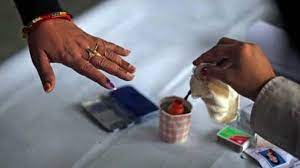Brij Bhardwaj
Popular rule is expected to return to Jammu and Kashmir in March or April next year after elections for Assembly in the Union Territory. The revised electoral rolls are expected to be ready by end of the year after that process of holding elections to Assembly will start. The thinking in official circles is that law and order situation in the UT has improved and there should be no difficulty in holding elections. State of Jammu and Kashmir was turned into two union territories after Article 370, which gave special status to state of Jammu and Kashmir, was abrogated,. One comprised of Jammu and Kashmir province while Ladakh was turned into a separate territory. Along with the holding of elections, Central Government may also consider the question of restoring statehood to Jammu and Kashmir, as was indicated when Article 370 was abrogated. The Centre feels that law and order situation has improved considerably in UT to make it possible to hold elections. There are few sporadic incidents from time to time involving foreign elements trained in Pakistan who are sent into the UT by groups based in Pakistan occupied Kashmir. A large number of militants involved in recent incidents of killing of persons belonging to minority community have been eliminated. The biggest gain is that educational institutions and markets are functioning normally and large number of tourists are visiting the UT. It is hoped that in near future UT will also attract investment to set up industries so that jobs could be provided for educated unemployed young men and young women. The BJP is hopeful that it will emerge as largest single largest party in the UT in the coming elections. It is hopeful of not only retaining its hold in Jammu province but also get few seats in Kashmir region. It is targeting backward communities like Paharis and Gujjars who may get reservations in jobs under the Scheduled Tribe act . This is under active consideration and may be done before the elections are held. The Congress party which in the past was a main challenge to BJP in Jammu region has been considerably weakened after senior leader and former chief Minister Ghulam Nabi Azad left the party and floated a regional outfit. Pro-independence or pro Pakistani outfits like Hurriyat Conference are no more active and no one hears anymore calls for hartal or a protest march which was a regular feature in the past. Regional parties like National Conference and PDP remain active and have pockets of influence in Kashmir Valley, but their influence in Jammu region has declined. The balance of seats in the Assembly between Jammu and Kashmir province has also undergone a change and both will find almost equal representation in the assembly. As such one may notice many changes in Jammu and Kashmir when elections are held in 2023. The State will remain a Muslim majority State despite fears expressed in some quarters. Kashmir is totally Muslim with number of minority community reduced considerably, while Jammu province has about 30 per cent Muslim population. Despite Ladakh region becoming a separate identity Jammu and Kashmir remains a composite UT with a mixed population. Another gainer after abrogation of Article 30 are women who were married to non State subjects. Under the State subject law men marrying women from outside conferred all rights on them but women on the other hand were deprived of all if they married non state subjects . This included right of jobs and property inheritance. They are positive gainers and also are displaced persons who settled in Jammu and Kashmir after partition of country who were treated as outsiders . Talks are on to establish new industries in the UT which include setting up a dry port in Jammu and Kashmir to facilitate exports . This will provide facilities like custom clearance in the UTitself and dispatch of goods in containers to port for onward destination


